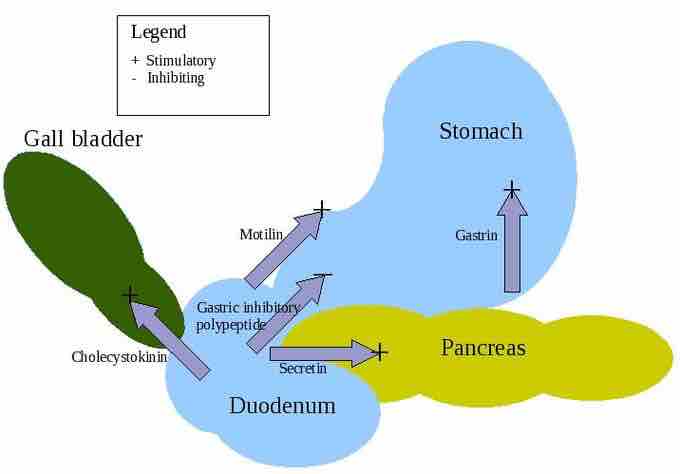The gastric phase is a period in which swallowed food and semidigested protein (peptides and amino acids) activate gastric activity. About two-thirds of gastric secretion occurs during this phase . Ingested food stimulates gastric activity in two ways: by stretching the stomach and by raising the pH of its contents. Stretch activates two reflexes: a short reflex mediated through the myenteric nerve plexus and a long reflex mediated through the vagus nerves and brainstem. Gastric secretion is stimulated chiefly by three chemicals: acetylcholine (ACh), histamine, and gastrin. ACh is secreted by parasympathetic nerve fibers of both the short and long reflex pathways. Histamine is a paracrine secretion from the enteroendocrine cells in the gastric glands. Gastrin is a hormone produced by enteroendocrine G cells in the pyloric glands. All three of these stimulate parietal cells to secrete hydrochloric acid and intrinsic factor. The chief cells secrete pepsinogen in response to gastrin and especially Ach, and ACh also stimulates mucus secretion. As dietary protein is digested, it breaks down into smaller peptides and amino acids, which directly stimulate the G cells to secrete even more gastrin: a positive feedback loop that accelerates protein digestion. Small peptides also buffer stomach acid so the pH does not fall excessively low. But as digestion continues and these peptides are emptied from the stomach, the pH drops lower and lower. Below pH of two, stomach acid inhibits the parietal cells and G cells: a negative feedback loop that winds down the gastric phase as the need for pepsin and HCl declines.

Digestion: Gastric Phase
During the gastric phase, gastrin is secreted. The stomach stretches and churns while enzymes break down proteins.